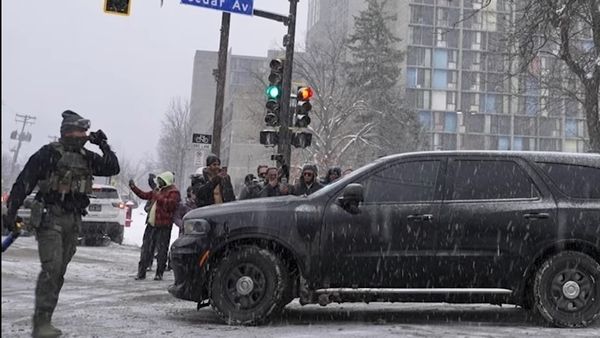
“He’s a communist. He’s antichrist. He’s against God,” shouts a protester as Mick Lynch and the rest of the RMT delegation arrive for talks. “Blimey,” says Lynch, sad eyes a-twinkle. “You need to wake up, young man!” adds the protester. “At least he called me young,” says Lynch. You need a thick skin to be a union leader in 2023.
Strike: Inside the Unions profiles three senior union figures as a winter of discontent blossoms into a spring of something worse. I never thought I’d see the day: since Margaret Thatcher’s defeat of the miners’ strike in 1985, it has seemed scarcely credible that organised labour could galvanise widespread industrial action, still less command public support for it.
We see Lynch, along with Unite’s Sharon Graham and the RCN’s Pat Cullen, sparring with my most esteemed media colleagues. We follow them while they shadow box a government that postures as though it isn’t wearing gloves, isn’t in the ring, and is definitely not coaching pay review bodies between rounds. Although two-thirds of the leaders profiled here are women, it’s Lynch and his unremittingly male negotiating team who are the focus. Time and again they strut in tweeds and flat caps through the streets to another face-off with the running dogs of capital. It’s as if Peaky Blinders never ended.
Not everybody in the media is a government lickspittle without two brain cells to rub together, but sometimes this programme makes you wonder. On Talk TV, for instance, presenter Mike Graham nominates RMT general secretary Lynch as Plank of the Week for fighting for a pay rise for his members. “They don’t need more money,” says Graham, although the cut in real wages train workers, along with nurses, teachers, TV critics and other key workers over the past decade – plus the growing incidence of workers using food banks and taking second jobs – suggests Graham has got his sums wrong.
Speaking of planks, Graham has previous with wood. He’s the shock jock who damned Insulate Britain’s Cameron Ford for being a carpenter and thus depleting natural resources. “Wood is regenerative, you can grow trees,” countered Ford. “You can’t grow concrete.” “Yes, you can,” retorted Graham.
Neither the government nor the companies involved in these many disputes agreed to take part in this series, so the makers strive for balance by including clips from the likes of Grant Shapps saying inflation is Vladimir Putin’s fault. We see Rishi Sunak tell us that the RCN’s call for a rise of 5% above inflation (which, just before Christmas, was running at 10.7%) is out of order. “I think most people watching would realise that is not affordable.”
I’d like to see the prime minister’s data for that belief. Mine suggests most people believe that the ones who don’t know what most people think are the politicians who have had a £250,000 swimming pool installed at their grade-II listed manor house requiring a special supply from the electricity company during a cost of living crisis.
Pat Cullen notes that the 4% pay rise offered to nurses by the independent pay review body actually represents a pay cut. She also argues that there’s nothing independent about the pay review body: it’s a fig leaf hiding government policy. Lynch, similarly, finds it curious to have negotiations with railway companies that have little room to manoeuvre since they are, he thinks, constrained by government policy. If, he says, those companies could negotiate independently, there might have been no need for strike action. Instead, as his assistant general secretary Eddie Dempsey puts it: “They’ve got a government that has cut their budgets and they ain’t got enough money. We’ve got members who ain’t got enough money. That’s a hard circle to square.”
Cards on the table: throughout my career I have been a member of the Nation Union of Journalists (other, non-unionised TV critics are available). Have you ever been on strike? Me neither, and I hope I never have to. There is one moment that captures how difficult and divisive strike action is. Sarah, a Unite union officer, arrives early at Walworth bus garage on the first day of a proposed 10-day strike by Abellio bus drivers in south London. It’s dark and no other pickets have arrived when she notices headlamps come on and a bus start moving toward her. It’s her colleague, Mark, who can’t afford to lose a day’s pay.
Sharon Graham, the first female general secretary of Unite, tells us that while Abellio made £350m profits in 2022, its bus drivers are the poorest paid in London. Abellio is owned by the Dutch government.
“Mark!” Sarah wails, as the double-decker edges towards her, “Don’t!” She steps aside. He drives off into the dawn, leaving Sarah in tears. “I’m so angry,” she says. Angry, perhaps not so much at Mark breaking ranks as at the hardship for bus drivers. No wonder, given that it comes at a time when profits are soaring.
• Strike: Inside the Unions was on BBC Two and is available on iPlayer







